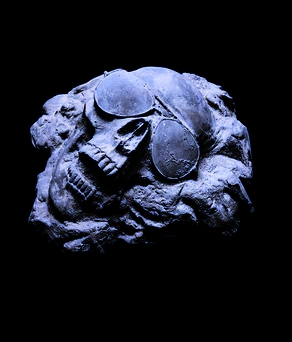I mean why 5, why 5 on each limb, why not 4 or 6. Why do our feet also have 5. Whats with our body being so symmetrical.
People who know anything about evolution, now is your time to shine.
Symmetry is useful for locomotion. It’s an easy way to get backup instances of things. By “easy” I mean it doesn’t take much “code” to accomplish for the value it produces.
When something is more valuable and “cheaper”/“easier” requiring less code to set up, it’s more likely to be selected for.
Basically, evolution produces organisms that work well in the environment, mainly by the environment trimming off the ones that don’t work there.
Well it turns out you can achieve all sorts of forward locomotion just by having two mirror copies of a thing and moving the mirror copies in an off-phase rhythm. Once you’ve got that back-and-forth timing, your body just needs to tend forward and suddenly you’re mobile.
Let’s look at it another way. One requirement for mobility is a direction. You can’t move without moving in a direction. A direction is a line. You can create movability by varying an organism’s form along the line of travel. The introduction of additional lines dilutes the motion-enabling asymmetry across multiple vectors.
The body form that concentrates the most variation along a single line is bilateral symmetry. Radial symmetry diffuses that variation across multiple lines, and hence doesn’t create motion.
I know I’m being really, really abstract here, but it’s a concrete fact of motion and geometry. Let me take another stab at summarizing why bilateral symmetry enable motion:
- simplest one-line directional geometry is actually radially symmetric. Think of a coke bottle or a flower. It has a line.
- bilateral symmetry actually has a plane, leading to more diffusion of aim
- but bilateral symmetry makes neural control easier: your signal just has to be A-B-A-B-A-B… . Left, right, left, right, etc
- With your radially symmetric form you need signaling like: A-B-C-D-E-A-B-C-D-E-A-B… . Like tuning the cylinders on a turboprop engine. This is how flagella move: in a corkscrew shape. It’s hard to coordinate.
Shit I’m just making it more complex. Bilateral symmetry gives you a nice combination of directionality (enforced by the way gravity squishes that plane down into a line of movement).
This is why you see more bilateral symmetry as organisms get larger: gravity requires asymmetric designs to be stable across the gradient. You see those circular-firing motility types at a more micro scale, where the effect of gravity is smaller. That radially-symmetric torpedo-sperm-flower-coke bottle shape needs to be in a well-organized circle in order for its thrust to not send the organism off on a crazy tangent, or best case traveling on an inefficient helical path. And even if the path is helical, that will only tend in a straight line, ie toward a target, if it’s not being distorted by gravity.
So the microscopic realm, where gravity is more negligible, you see more organisms that use a helical strategy for motion.
As gravity gets more primary, at larger scales, you start getting shapes like fish that always keep one side up and another side down. And the way the fish moves, despite having variation top to bottom as well as front to back, is by having no variation left to right. That lack of left-right variation allows the complementary action of its left and right to balance out to a straight line.
Following the A-B-A-B firing pattern, the fish moves its tail back and forth and achieves forward motion.
I hope that helped at least a bit. I know it was convoluted.
And shine you did!
Damn. That’s fucking awesome, thank you for the explanation.
Hi, what school of science is this? What sort of textbook might explain the things you just did?
None that I’m aware of, that was my own synthesis based on my own thinking.
edit: actually robotics might have some insight into this
illustrate this and publish it.
I was gonna say “too lazy” but there is AI now so maybe I can have my minions do it for me
Thanks, that’s a great read!
Thank you. But this doesn’t explain the number of digits in hands and feet, does it? Great read BTW.
Once most societies decided to use a base 10 counting system, evolutionarily it just made the most sense to have a corresponding number of digits to help with maths.
Six fingers would have us at Base 12, yet another argument against intelligent design.
That’s… not how evolution works
The wikipedia article Polydactyly in stem-tetrapods has some explanations on how we ended up with 5 fingers and toes.
The gist of it is that tetrapods (four-limbed vertebrate animals) evolved from a fish similar to a lobe-finned fish that had 5 sets of bones in each of its fins that evolved into fingers and toes. Some tetrapods have subsequently lost digits but the basal state was five.
There’s a book, Your Inner Fish by Neil Shubin that’s full of this kind of stuff. Highly recommend.
I love it. So many things in the world don’t really have an “explanation,” they have a “story.”
The reason they are as they are is just because of prior conditions.
Amazing book. I recommend reading it if you’re interested in evolution.
Some people do have 6.
Why 6??? Why not 5???
But seriously, let me make the case for 5.
To grip anything you need at least two. But two digits will give you an unstable pincer-like grip so let’s call 3 the true minimum. So we need a minimum of 3 but our control and precision is improved with another one. And it’s a good idea to have a backup in case one gets injured, so that brings us to 5. Five is more than we honestly need and evolution budgets very strictly, which is why you already see finger #5 shrinking in size so it costs less resources over your lifetime. It truly is there just as a backup.
Now forget all that because it’s bullshit. 5 digits was established in our ancestor organisms before gripping things even came about with the opposable thumb. So what were those organisms doing with digits? Walking on them. There are two styles of walking tool: paw and hoof. The paw has flexible digits that help mold the step to the shape of the ground for maximum stability and traction. As a bonus you also get some sensory feel. Hoofs go the other way: a hard and durable shoe that will compress the soft ground or catch on hard surfaces. Organisms that run fast and far tend to have hooves because they aren’t picking their path super carefully and durability is the most important thing. Predators tend to have paws because they ARE picking their paths with great precision and they need to walk carefully, sometimes with stealth, and be able to build up their traction for a spring.
So if you’re going to design a paw with flexible digits that can mold to the ground, how many digits should it have? A single digit is no better than a hoof. Two points on the ground form a line which is tippy and still not stable yet. You need the third minimally to form a triangle that’s stable. Now control and flexibility to match uneven ground surface will increase with a fourth. And it makes sense to have a backup in case one digit is damaged, so you have five. However, fine control isn’t as important for paws as our hands, so the added value of fine control and having a backup adds up to a less, and evolution budgets very strictly, so you see digit number 5 fading from pawed organisms, and already vestigial in many. You could consider the “palm” of the paw to be a digit that works in tandem with the others, though, which gets us back to 5. Five really does seem to be an inevitable number, doesn’t it.
That should cover it. Be sure to drink water before bed.
I would like to subscribe to finger and toe facts
I don’t want my little finger be vanished after my 3 reincarnations, I will try to use it more often, I guess.
Nice try, AI image generator!
Peace!

If you want to talk weird, each leg on a horse is actually one really long finger.
Only the lowest part.. But still weird.
So horses are flipping everyone off at all times.
If strangers kept jumping on my back to get a ride I’d be like that too.
I got 4 really long fingers - am I a horse now?
Of course.
Only if it’s one per extremity. Like running around on your middle fingers
You were always a horse.
Yes, with a 4HP engine
What number of fingers or toes would be not weird?
There are humans with 6. 5 is just the most common.

Yes but thats a genetic mutation I think
Having any fingers at all is a genetic mutation, thats how evolution works, it mutates, and if the mutation works well enough, it gets passed on.
The only difference between you and a genetic mutation is that your ancestors were better at breeding.
Is that a burn? I dont know if Im being insulted here and I dont know how to react.
It’s a burn and also true. If a genetic mutation becomes prevalent enough, it’s no longer really considered to be a “mutation”.
Yeah, “mutation” is like “terrorist”. No one calls you they of you win.
Come on now. No need to call their grandma a whore.
It’s actually the dominant gene. Having 5 is recessive.
Not a mutation, was a pre-order perk.
There are also humans with less than 5, some of whom are born that way.
It sure would be handy to have 3 fingers and 2 thumbs. Evolution is messy, not planned.
We are devolved from octopuses.
Octopuses are the goats.
Actually goats are goats.
Also I HATE the fact that the plural for octopus is octopuses and nit octupi.
Octopi is doubly wrong, it’s Greek, not Latin. If it wasn’t octopuses it should be octopodes, ock-TOP-oh(uh)-deez.
The more usual Greek word seems to have been polypous (also pōlyps), from polys “many” + pous, but for this word Thompson suggests folk-etymology and a non-Hellenic origin.
The classically correct Greek plural (had the word been used in this sense in ancient Greek) would be octopodes.
Octopi regards the -us in this word as the Latin noun ending that takes -i in plural. Like many modern scientific names of creatures, it was formed in Modern Latin from Greek elements, so it might be allowed to partake of Latin grammar in forming the plural.
Still I’d prefer octopi since despite origins in different languages its now a word in english and we can use it however english speakers like and not the greek.
i debated writing octopi ngl
Really? Don’t recall ever hearing octopuses… It sounds so awkward
Because 5 is all you can fit up your ass, probably.
You know what they say about guys with big hands.
Yep, big assholes.
How many gummies did you eat?
This article might help
Well in summary, while scientists have unlocked the mechanism, the question of why humans typically have five fingers and toes remains unanswered. Evolution has stuck with this number, despite the possibility of having more digits, suggesting a complex interplay of genetic and developmental factors that science has yet to fully understand.
Thats cool!
Bone formation is extremely complex. Nearly all large mammals have the same exact bones in different sizes. Dogs, cats, and even bats (their wings) all have four fingers and a thumb.
deleted by creator
My cousin was born prematurely with 4 toes on each foot.
Some are born with 6 fingers on each hand.
Now, tell me more about that cookie you ate earlier.
It’s because God had five fingers on each hand, and five toes on each foot, and he had to use all twenty to create the world. Humans have yet to unlock this potential.
How do i unlock being a complete egostitical sadist who demands people blindly worship me to gain eternal bliss no mater what or who they kill or harm in their life as long as they feel bad about it and say im rad?
I think the dude was just making a joke
Yeah his comment reads like a joke. It would be better if it was funny.
Drink more Bailey’s












